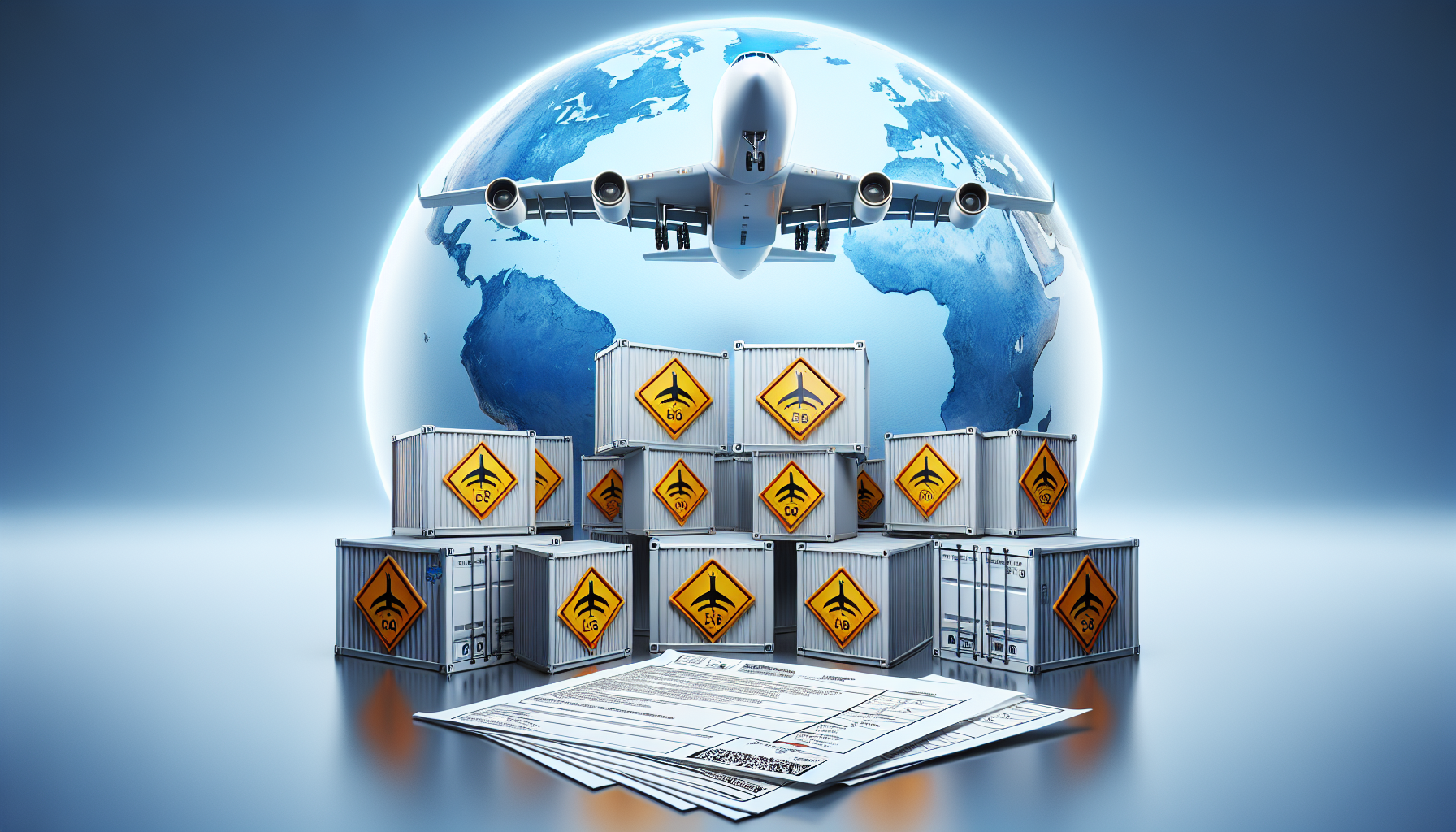Can ISF Filings Be Submitted For Goods That Are Transported Via International Air Cargo Consolidators With Dangerous Goods?
When it comes to transporting goods via international air cargo consolidators, the question of whether ISF filings can be submitted for dangerous goods arises. This article explores the possibility of submitting ISF filings for goods that fall under the dangerous goods category. The safety regulations and compliance requirements associated with transporting dangerous goods via air cargo consolidators are examined, shedding light on the potential challenges and considerations involved. Understanding the intricacies of this process is crucial for businesses involved in global trade to ensure smooth operations and compliance with international regulations.

Overview
Explanation of ISF filings
ISF filings, or Importer Security Filings, are a critical requirement for ensuring the safety and security of goods being transported internationally. These filings involve the submission of necessary information about the cargo to the customs authorities before the shipment arrives at the destination port. It is a way of providing the government with advance information about the goods, enabling them to identify any potential security risks and streamline the clearance process.
Definition of international air cargo consolidators
International air cargo consolidators are companies that specialize in consolidating various shipments from multiple shippers into a single unit for air transportation. They play a crucial role in simplifying the logistics process and optimizing the use of cargo space on aircraft. These consolidators act as intermediaries between the cargo owners and the airlines, ensuring efficient and cost-effective transportation of goods by combining smaller shipments into larger ones.
Explanation of dangerous goods in cargo transportation
Dangerous goods, also known as hazardous materials, are substances or items that pose a risk to health, safety, environment, or property during transportation. These goods can range from chemicals and flammable materials to medical waste and radioactive substances. Transporting dangerous goods requires adherence to specific regulations and guidelines to ensure their safe handling, transportation, and storage throughout the supply chain.
The Requirements for ISF Filings
Submission timeframe
To comply with the ISF filing requirement, importers or their authorized agents must submit the necessary information to the customs authorities at least 24 hours before the shipment is loaded onto the aircraft at the foreign port of departure. This timeframe allows the customs officials to assess the cargo’s security risks before it enters the United States.
Required information for ISF filings
ISF filings require the submission of specific information about the cargo, including the importer’s identification, seller’s identification, manufacturer’s identification, container stuffing location, consolidator’s identification, and details about the consignee, along with the shipping, invoice, and purchase order numbers. It is essential to provide accurate and complete information to avoid delays or penalties.
Exceptions for goods transported via international air cargo consolidators
Goods transported via international air cargo consolidators enjoy certain exceptions when it comes to ISF filings. As per the US Customs and Border Protection (CBP), when the consolidator files an ISF for a consolidated shipment, the individual shippers are exempt from filing their own ISFs. This exemption streamlines the process for shippers and reduces the administrative burden.

The Role of International Air Cargo Consolidators
Definition of international air cargo consolidators
International air cargo consolidators play a vital role in the transportation industry by consolidating multiple shipments from different shippers. These companies act as intermediaries, handling the logistics, documentation, and compliance requirements associated with air cargo transportation. They work closely with airlines, freight forwarders, and customs authorities to ensure smooth and efficient movement of goods.
Services provided by international air cargo consolidators
International air cargo consolidators offer a range of services to facilitate the transportation process. These include cargo consolidation, documentation preparation, customs clearance, tracking and monitoring, warehousing, and distribution. They leverage their expertise and industry relationships to provide cost-effective solutions and ensure timely delivery of goods to the designated destinations.
Benefits of using international air cargo consolidators
Using international air cargo consolidators offers numerous benefits for shippers. Firstly, consolidators allow smaller shippers to access cost-effective air transportation by combining their shipments with others. This helps optimize the use of cargo space and reduces shipping costs. Secondly, consolidators handle the complex logistics, paperwork, and regulatory compliance processes, saving shippers valuable time and resources. Lastly, consolidators provide enhanced visibility and tracking capabilities, allowing shippers to monitor the progress of their shipments and make informed decisions.
Transporting Dangerous Goods via International Air Cargo Consolidators
Regulations and guidelines for transporting dangerous goods
Transporting dangerous goods via air cargo requires strict adherence to international regulations and guidelines. The International Air Transport Association (IATA) sets industry standards for the safe transportation of dangerous goods by air. These standards include proper packaging, labeling, documentation, and handling procedures to minimize the risks associated with dangerous goods.
Documentation and labeling requirements
When transporting dangerous goods, proper documentation and labeling are crucial. The shipper must provide accurate and complete hazardous materials declarations, including the UN number, proper shipping name, class, and packing group. Additionally, packages containing dangerous goods must be labeled with appropriate hazard labels and handling instructions to ensure safe handling and identification throughout the transportation process.
Safety measures and precautions
To ensure the safety of personnel and prevent accidents, various safety measures and precautions must be taken when handling and transporting dangerous goods. These include proper training for personnel involved, conducting regular safety inspections, using suitable packaging and containment systems, complying with temperature control requirements for certain substances, and following strict protocols for handling emergencies or spills.
ISF Cargo for more Information
ISF Filings for Goods Transported via International Air Cargo Consolidators with Dangerous Goods
Can ISF filings be submitted for goods with dangerous goods?
Yes, ISF filings can be submitted for goods transported via international air cargo consolidators, even if they contain dangerous goods. The filing requirements remain the same, and the consolidator is responsible for including the necessary information related to the hazardous materials in the submission.
Procedure for submitting ISF filings for goods with dangerous goods
When submitting ISF filings for goods with dangerous goods, the consolidator must ensure that all necessary information related to the hazardous materials is included in the filing. This includes the proper shipping name, class or division, packing group, and UN number, among other required details. The consolidator must also ensure that the dangerous goods are accurately declared and properly documented to comply with all relevant regulations.
Potential challenges or limitations
Transporting goods with dangerous goods via international air cargo consolidators may pose certain challenges and limitations. For instance, some airlines or countries may have restrictions on certain types of dangerous goods, limiting the options for transportation. Additionally, the stringent regulations governing the transportation of dangerous goods require meticulous planning, documentation, and compliance, which may increase the complexity and cost of the shipment.
Consequences of Non-Compliance
Penalties for non-compliance with ISF filings
Failure to comply with the ISF filing requirements can result in significant penalties and delays. The US Customs and Border Protection may impose fines on importers or their agents for non-compliance, which can range from a few thousand dollars to tens of thousands of dollars per violation. Non-compliance can also lead to shipment holds, examinations, and even seizure of goods, causing further financial losses and disruptions to the supply chain.
Liabilities for non-compliance with regulations for transporting dangerous goods
Non-compliance with the regulations for transporting dangerous goods can have severe consequences. In addition to legal penalties, non-compliant shippers may face civil liabilities for any damages or injuries caused by their non-compliant shipments. These liabilities can include fines, compensatory damages, and even criminal charges in extreme cases. It is crucial for shippers to be fully aware of and adhere to the regulations to avoid such liabilities.
Risk mitigation strategies to avoid non-compliance
To avoid non-compliance with ISF filings and regulations for transporting dangerous goods, shippers can implement various risk mitigation strategies. These include ensuring accurate and timely submission of ISF filings, partnering with reputable international air cargo consolidators with experience in handling dangerous goods, conducting thorough compliance audits, providing comprehensive training to personnel involved in the shipping process, and maintaining updated knowledge of the changing regulatory landscape.
Conclusion
In conclusion, ISF filings are crucial for ensuring the safety and security of goods transported via international air cargo consolidators. Regardless of whether the cargo contains dangerous goods or not, compliance with the filing requirements is essential. International air cargo consolidators play a vital role in simplifying logistics, providing value-added services, and optimizing the transportation of goods. When it comes to transporting dangerous goods, strict adherence to regulations, proper documentation, and safety precautions are paramount. Non-compliance can result in significant penalties, liabilities, and disruptions to the supply chain. By understanding the requirements, utilizing reputable consolidators, and implementing risk mitigation strategies, shippers can navigate the complex process successfully and ensure the safe and efficient movement of goods.
Learn more about ISF and Entry Filing. Know more for Secure bond application for importers. Feel free to Importer Security Filing customer support. Return to ISF Cargo.
